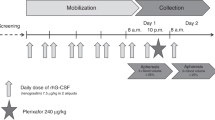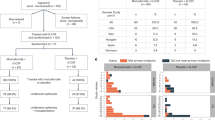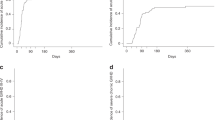Abstract
Forty-seven patients with stage II, III, or IV breast cancer undergoing autologous peripheral blood progenitor cell (PBPC) transplantation were randomized to placebo (n = 13) or to one of five sequential dose cohorts of pegylated (PEG) recombinant human megakaryocyte growth and development factor (PEG-rHuMGDF) (1.0, 2.5, 5.0, 7.5, or 10.0 μg/kg/day) (n= 34). Blinded study drug was started on the day of transplantation and was continued until the platelet count was ⩾100 × 109/l or a maximum of 21 days. PBPCs were mobilized with filgrastim (r-metHuG-CSF) and all patients received filgrastim starting on day +2 after transplantation. The nadir platelet count was not affected by treatment. The median time to platelet recovery was 11 and 12 days for the placebo and combined PEG-rHuMGDF groups, respectively. No trends in adverse events suggested dose- or treatment-related toxicity. Two patients withdrew from the study because of an adverse event (allergic reaction in the 7.5 μg/kg group) probably related to study drug, and veno-occlusive disease (VOD) (in the 5 μg/kg group) which was felt not to be related to study drug by the investigator. No patients developed neutralizing antibodies to MGDF. Day +21 and day +28 platelet counts were higher in the group receiving PEG-rHuMGDF (246 vs 148 × 109/l and 299 vs 145 × 109/l, respectively; both P < 0.05). PEG-rHuMGDF up to 10 μg/kg/day was well tolerated. In this study, there was no effect of study drug on initial platelet engraftment at the doses studied. However, the efficacy of other doses is unknown. Bone Marrow Transplantation (2000) 26, 141–145.
This is a preview of subscription content, access via your institution
Access options
Subscribe to this journal
Receive 12 print issues and online access
$259.00 per year
only $21.58 per issue
Buy this article
- Purchase on Springer Link
- Instant access to full article PDF
Prices may be subject to local taxes which are calculated during checkout


Similar content being viewed by others
References
Peters WP, Rosner G, Ross M et al. Comparative effects of granulocyte–macrophage colony-stimulating factor (GM-CSF) and granulocyte colony-stimulating factor (G-CSF) on priming peripheral blood progenitor cells for use with autologous bone marrow after high-dose chemotherapy Blood 1993 81: 1709–1719
Beyer J, Schwella N, Zingsem J et al. Hematopoietic rescue after high-dose chemotherapy using autologous peripheral-blood progenitor cells or bone marrow: a randomized comparison J Clin Oncol 1995 13: 1328–1335
Bolwell BJ, Goormastic M, Yanssens T et al. Comparison of G-CSF with GM-CSF for mobilizing peripheral blood progenitor cells and for enhancing marrow recovery after autologous bone marrow transplant Bone Marrow Transplant 1994 14: 913–918
Smith TJ, Hillner BE, Schmitz N et al. Economic analysis of a randomized clinical trial to compare filgrastim-mobilized peripheral-blood progenitor-cell transplantation and autologous bone marrow transplantation in patients with Hodgkin's and non-Hodgkin's lymphoma J Clin Oncol 1997 15: 5–10
Schmitz N, Linch DC, Dreger P et al. Randomised trial of filgrastim-mobilised peripheral blood progenitor cell transplantation versus autologous bone-marrow transplantation in lymphoma patients Lancet 1996 347: 353–357
Haas R, Witt B, Mohle R et al. Sustained long-term hematopoiesis after myeloablative therapy with peripheral blood progenitor cell support Blood 1995 85: 3754–3761
Reiffers J, Faberes C, Boiron JM et al. Peripheral blood progenitor cell transplantation in 118 patients with hematological malignancies: analysis of factors affecting the rate of engraftment J Hematother 1994 3: 183–191
Hassan HT, Zander AR . Thrombocytopenia after high-dose chemotherapy and autologous stem cell transplantation: an unresolved problem and possible approaches to resolve it J Hematother 1996 5: 407–414
Bentley SA, Brecher ME, Powell E et al. Long-term engraftment failure after marrow ablation and autologous hematopoietic reconstitution: differences between peripheral blood stem cell and bone marrow recipients Bone Marrow Transplant 1997 19: 557–563
Kaushansky K, Lok S, Holly RD et al. Promotion of megakaryocyte progenitor expansion and differentiation by the c-Mpl ligand thrombopoietin Nature 1994 369: 568–571
Wendling F, Maraskovsky E, Debili N et al. c-Mpl ligand is a humoral regulator of megakaryocytopoiesis Nature 1994 369: 571–574
Bartley TD, Bogenberger J, Hunt P et al. Identification and cloning of a megakaryocyte growth and development factor that is a ligand for the cytokine receptor Mpl Cell 1994 77: 1117–1124
de Sauvage FJ, Hass PE, Spencer SD et al. Stimulation of megakaryocytopoiesis and thrombopoiesis by the c-Mpl ligand Nature 1994 369: 533–538
Kuter DJ, Beeler DL, Rosenberg RD . The purification of megapoietin: a physiological regulator of megakaryocyte growth and platelet production Proc Natl Acad Sci USA 1994 91: 104–111
Kato T, Ogami K, Shimada Y et al. Purification and characterization of thrombopoietin J Biochem 1995 118: 229–236
Miyazaki H, Horie K, Shimada Y et al. A simple and quantitative liquid culture system to measure megakaryocyte growth using highly purified CFU-MK Exp Hematol 1995 23: 1224–1228
Hunt P, Li Y-S, Nichol JL et al. Purification and biologic characterization of plasma-derived megakaryocyte growth and development factor Blood 1995 86: 540–547
Harker LA, Marzec UM, Hunt P et al. Dose-response effects of pegylated human megakaryocyte growth and development factor on platelet production and function in nonhuman primates Blood 1996 88: 511–521
Ulich TR, del Castillo J, Yin S et al. Megakaryocyte growth and development factor ameliorates carboplatin-induced thrombocytopenia in mice Blood 1995 86: 971–976
Fanucchi M, Glaspy J, Crawford J et al. Effects of polyethylene glycol-conjugated recombinant human megakaryocyte growth and development factor on platelet counts after chemotherapy for lung cancer New Engl J Med 1997 336: 404–409
Basser RL, Rasko JE, Clarke K et al. Randomized, blinded, placebo-controlled phase I trial of pegylated recombinant human megakaryocyte growth and development factor with filgrastim after dose-intensive chemotherapy in patients with advanced cancer Blood 1997 89: 3118–3128
Vadhan-Raj S, Murray LJ, Bueso-Ramos C et al. Stimulation of megakaryocyte and platelet production by a single dose of recombinant human thrombopoietin in patients with cancer Ann Intern Med 1997 126: 673–681
Bolwell B, Overmoyer B, Goormastic M et al. Breast cancer patients have a higher platelet count six weeks after autologous PBPC transplant than patients with hematologic malignancies Blood 1997 90: 355b (Abstr. 4348)
Basser RL, Rasko JE, Clarke K et al. Thrombopoietic effects of pegylated recombinant human megakaryocyte growth and development factor (PEG-rHuMGDF) in patients with advanced cancer Lancet 1996 348: 1279–1281
Marks LB, Rosner GL, Prosnitz LR et al. The impact of conventional plus high dose chemotherapy with autologous bone marrow transplantation on hematologic toxicity during subsequent local-regional radiotherapy for breast cancer Cancer 1994 74: 2964–2971
Marks LB, Halperin EC, Prosnitz LR et al. Post-mastectomy radiotherapy following adjuvant chemotherapy and autologous bone marrow transplantation for breast cancer patients with ⩾10 positive axillary lymph nodes Int J Radiat Oncol Biol Phys 1992 23: 1021–1026
Acknowledgements
Janet Lee Nichol and MaryAnn Foote, assisted in the writing of this manuscript.
Author information
Authors and Affiliations
Rights and permissions
About this article
Cite this article
Bolwell, B., Vredenburgh, J., Overmoyer, B. et al. Phase 1 study of pegylated recombinant human megakaryocyte growth and development factor (PEG-rHuMGDF) in breast cancer patients after autologous peripheral blood progenitor cell (PBPC) transplantation. Bone Marrow Transplant 26, 141–145 (2000). https://doi.org/10.1038/sj.bmt.1702465
Published:
Issue Date:
DOI: https://doi.org/10.1038/sj.bmt.1702465
Keywords
This article is cited by
-
SCT in Jehovah's Witnesses: the bloodless transplant
Bone Marrow Transplantation (2008)
-
The molecular and cellular biology of thrombopoietin: the primary regulator of platelet production
Oncogene (2002)



